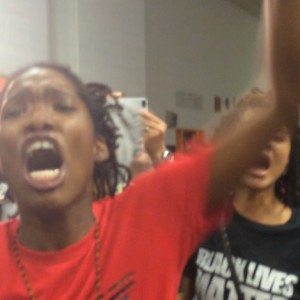Chaos erupted during a speech by D.C. Mayor Muriel Bowser Thursday morning as dozens of Black Lives Matter activists disrupted her unveiling of a new strategy to fight spiking violent crime in the nation’s capital.
Shouting “MORE POLICE IS NOT THE ANSWER,” “WE WANT JOBS” and “NO JUSTICE, NO PEACE,” the activists all but drowned out the mayor as she spoke at the former Malcolm X Elementary School in Ward 8, the District’s poorest area.
Bowser delivered her speech through the commotion, telling the demonstrators she wouldn’t be deterred by them. “I will not be shouted down or scared away,” the mayor said at one point.
Bowser’s new plan to combat violent crime includes putting more police officers on the streets; creating incentives for businesses, property owners and churches to install security cameras; and toughening penalties for violent crimes committed in parks, recreation centers and the public transit system. These proposals come in response to a 36 percent increase in D.C. murders this year.
RELATED: D.C. Mayor Pledges Further Action Against Violent Crime
But Black Lives Matter activist Eugene Puryear, who ran for D.C. Council last year as the candidate of the progressive Statehood Green Party, told InsideSources the mayor’s ideas are based on several faulty assumptions.
“We know for sure, for instance, that tougher penalties don’t help reduce crime,” he said. “We know for sure, for instance, that there is no real solid data on why exactly [D.C.’s violent crime] is ticking up.”
Puryear then criticized Bowser and her administration for pushing “quick solutions” based on “political expediency” and not doing enough to address poverty.
“They have to get people actual jobs, and they have to meet the tens of thousands of people who need affordable housing,” he said.
Update: 5:23 p.m.:
Will Sommer of the Washington City Paper flagged a statement Puryear and other activists issued today.
Our demand is that the Bowser Administration immediately scrap its police powers proposal and direct resources to the vast array of community-led peacekeeping organizations to scale-up their operations. This is a fact-based way for communities to decrease the violence in their area in a way that does not stigmatize or criminalize community members.

